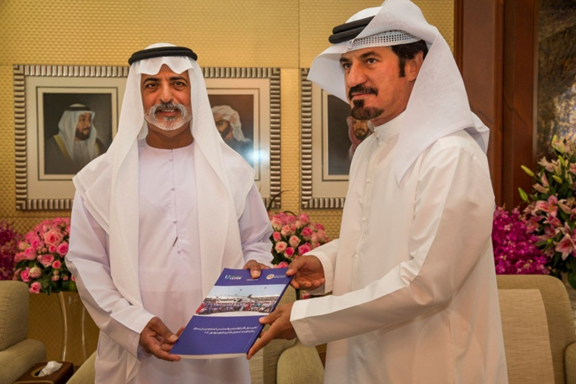The social and economic impact of volunteerism in sport, its contribution to society and the economy of nations hosting international events, is highlighted today by a unique UAE report.
The first copy of the report was presented to H.E. Sheikh Nahayan Mabarak Al Nahayan, Minister of Culture, Youth and Community Development, and Chairman of the General Authority of Youth and Sports Welfare, by Dr Mohammed Ben Sulayem, President of the Automobile and Touring Club of the UAE.
Based on an intensive study of the 2012 F1 Etihad Airways Abu Dhabi Grand Prix, it shows volunteerism around the world as a prolific opportunity for industries, policy makers and regulators to further enhance national competitiveness and the labor market.
The 82-page document calls for more government-backed research to underline how sports volunteerism can contribute to both economic and societal improvements for a host nation.
The report calculates that more than 600 volunteers and unpaid officials working on the 2012 F1 Grand Prix at Yas Marina Circuit produced an economic savings of AED6,641,500 ($US1.81m) by giving 53,448 hours towards preparation and running of the event.
The first study of its kind in the world of international motor racing, the report was commissioned by Sulayem and developed by the ATCUAE team in conjunction with the University of Ulster, one of the UK’s leading research centers.
Sulayem, Vice President of the FIA for Sport, said: “This is the first study which puts into proper perspective the true social and economic impact of volunteerism in F1 racing. When you consider that volunteerism can also directly and indirectly contribute to a nation’s economy, the calculated savings of more than AED6 million for the 2012 F1 Etihad AirwaysAbu Dhabi Grand Prix is quite conservative.”
“We also have to take into account the increase in tourism, the high level of national exposure, as well as the business and investment opportunities that come about as a result of hosting marquee sporting events. While these particular figures have not been researched as part of this study, it’s obvious that they would be very significant.”
The report calls for further research to assess the economic and social impact of volunteerism in sports in the UAE, now a well-established venue for world-class events, by the national motor sport authority in cooperation with the Ministry of Culture, Youth and Community Development, and with all Clubs and Federations.
Said Sulayem: “Presenting these findings to government and its policy makers is an important first step in advancing the promotion of volunteerism as a key aspect of Emirati life in the future.”
While sports volunteerism is relatively new in the UAE, it is firmly entrenched in other parts of the world and seen as critical to the success of the sports industry itself. For example, in England in 2010, almost 2 million adults contributed at least one hour per week to voluntary sporting activities. In New Zealand, almost 830,000 individuals volunteered in sport in 2007, approximately 25.3% of the population. In 2006, more than 1.7 million Australian citizens volunteered in sport.
The report reveals a strong profile of the UAE’s FI volunteers as well educated, highly skilled and employed in full-time jobs. It says that 81% of the officials and marshals have attained higher education, whether undergraduate, post graduate, professional certificates or undergraduate diploma, and 82% work full time.
It also says that their work as F1 volunteers and officials enhanced their managerial and other transferrable skills in areas including safety, communication, conflict resolution, time management and crisis management.
The report says the work of volunteers at the event positively impacted on UAE society by generating an elevated awareness of the country as a business and tourism destination. It also boosted civic and national pride in the achievements of the UAE, as well as assisting towards the creation of a more skilled labor force.
Dr. David Hassan, Senior Lecturer in Sport and Exercise, at the University of Ulster and a member of the executive research team, said: “This study has reinforced the level of contribution sports volunteerism can make to a host society and its national economy.
“Many countries have already realized this symbiotic relationship and are profiling volunteerism in a way it permits the impact on public policy and its central role in wider society. Therefore it would be prudent were the findings of this report communicated to all relevant stakeholders within the UAE.”
He added: “Achieving an acknowledgment of these outcomes would begin the process of reversing the limited awareness and, for some, misunderstandings which commonly surrounds the concept of volunteerism in certain settings.
“Incorporating sports volunteerism into public policy programs in the UAE would represent significant progress as would a fundamental recognition of programs promoted by organizations like the ATCUAE to achieving these aims.”



